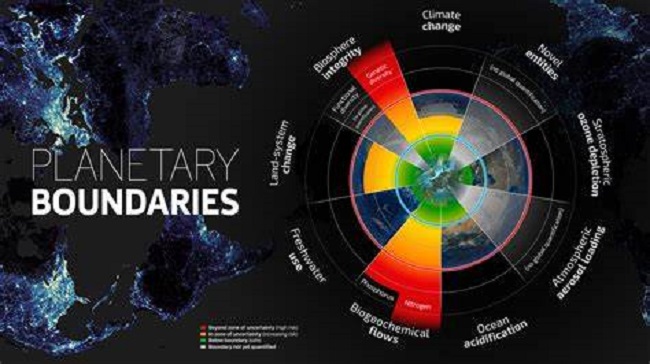– Advertisement –
A groundbreaking scenario study in the top journal Nature is now looking far beyond today, presenting projections of the climate and environment up to the end of the century for different policy pathways.


The reference point is the “planetary boundaries”, which define the safe operating space for humanity.
According to the study, sustainability will remain a critical issue for decades to come, but ambitious measures can achieve a situation at least similar to 2015 by 2050 and significantly improve it by 2100. The study was co-authored by the Potsdam Institute for Climate Impact Research (PIK).
“Human civilisation has reached a critical juncture, and using a novel methodology, we show how it can continue to develop without ruining its natural foundations,” says PIK Director Johan Rockström, co-author of the study.
“This is the most comprehensive coupling so far of the framework of planetary boundaries, which has originally been geared towards taking stock of the current situation, to data from model-based future scenarios. It results in a valuable navigation system for policymakers. We can clearly quantify the danger of business as usual, while showing that ambitious change pays off,” he adds.
Rockström played a leading role in developing the planetary boundaries concept in 2009. It defines the upper limit of the safe zone and tracks an increasing and high-risk level beyond this limit, for nine systems, including climate change, ocean acidification and changes in the nitrogen and phosphorus cycles, freshwater systems and biosphere integrity.
The research team also draws on the Integrated Assessment Model IMAGE, which is widely used in climate research, providing a detailed depiction of how human activities affect the environment.
Detlef van Vuuren, who has significantly expanded this model, is the study’s lead author. He is a professor at Utrecht University and senior researcher at the PBL Netherlands Environmental Assessment Agency.
Climate policies will not be enough, on its own
Even now, as a 2023 study co-authored by PIK showed, six of the nine boundaries have already been transgressed, meaning that systems are outside the safe zone. The new study indicates a continuous deterioration until 2100 for almost all categories – with the exception of the stratospheric ozone layer and air pollution – for a business-as-usual scenario without any additional policy measures.
By 2050, climate and nitrogen pressures will already be well into the high-risk range. What’s more, ambitious climate policies aimed at limiting global heating to a maximum of 1.5°C will not be enough, on their own, to get us out of the high-risk range across the board by the end of the century.
Of course, climate action will have positive side effects: moving away from combustion engines will result in better air quality, while reforestation will support more sustainable land use. But there will also be problematic consequences, for example from climate protection through the mass cultivation of bioenergy crop. The study therefore culminates in the question: what other ambitious and technically feasible measures would further reduce the transgression of planetary boundaries?
The search for even better measures
The research team models a scenario that supplements ambitious climate policy with additional measures: a shift to a low-meat diet (the so-called EAT-Lancet Planetary Health Diet), halving food waste, and efficient use of water and nutrients. In this projection, it appears that the deterioration of the Earth’s systems can be stalled and turned around: in almost every respect, the planet would be at least as healthy in 2050 as it was in 2015, and it would continue to recover in the second half of the century.
“But even in this scenario, planetary boundaries will still be exceeded in 2100,” emphasises lead author Detlef van Vuuren, “namely for the climate, the phosphorus and nitrogen cycles, and the integrity of the biosphere. The search for even better policy measures therefore remains on the agenda. And to assess what they can achieve, our study provides a viable scientific approach.”










